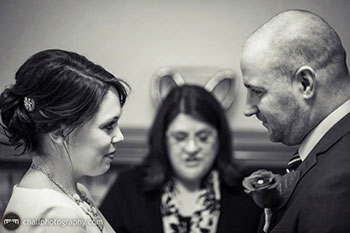
When you’re trying to plan a wedding, you find the suddenly you have to be an expert on everything! It’s confusing to try to understand the difference between different types of wedding officials, but we are here to explain the difference.
A minister can officiate a wedding, but most ministers will be restricted in what they can or will officiate, due to their religious affiliation with the church they belong to. This is a great choice for individuals who already belong to a church that they regularly attend, if they want a traditional church ceremony.
A justice of the peace is a special type of court officer that can perform civil marriages. These are a simple option for individuals who want nothing more than a marriage certificate, but they are limited in terms of schedule and location, and are strictly no-frills marriage ceremonies.
Lastly, a wedding officiant is anyone who can legally officiate a marriage ceremony. In wider use, a wedding officiant often refers specifically to a non-denominational and sometimes non-religious official who carries no affiliation with a church. Couples who don’t regularly attend a religious service or church often find this sort of wedding officiant ideal because of the flexibility this approach affords. When you use a non-denominational wedding officiant, you aren’t bound by the limits of any specific religious tradition or dogma. Couples who have differing religious backgrounds also tend to prefer a wedding officiant like this, because multi-religious ceremonies can be custom-made, honoring the religious tradition and beliefs of both families. At I Tie the Knots, we have even written ceremonies that include Catholic liturgy and Hindu ceremonies in Sanskrit! For couples that prefer a non-religious ceremony, wedding officiants also afford this flexibility, without the shortness and rigidness of the courthouse ceremony. Most wedding officiants, such as ourselves, also offer quick elopement ceremonies, which is a more flexible option as compared to the justice of the peace ceremonies. Officiants offer these quick ceremonies during nights and weekend hours, where a justice of the peace would often have a narrow time availability.
Overall, a minister, justice of the peace, and a non-denominational wedding officiant are all perfectly capable of running your wedding ceremony. If you want the ultimate customization and flexibility in schedule and ceremony your best bet is a non-affiliated wedding officiant such as I Tie the Knots.
